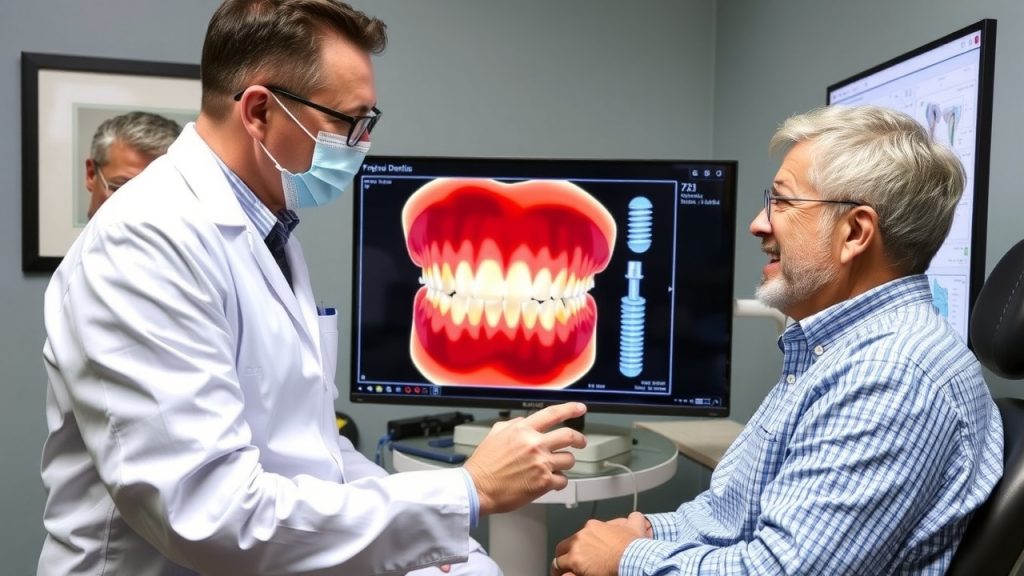Get your dental implants at Johnstown Dental Care in Vanatta, OH, where we prioritize your smile and overall dental health. Our expert team is dedicated to providing reliable, long-lasting solutions to restore your confidence and improve your oral function. With advanced technology and personalized care, we ensure that every step of the dental implant process is smooth, comfortable, and effective, helping you achieve a healthy, beautiful smile. Trust us to restore your dental health with precision and care.
Why Choose Dental Implants Vanatta OH ?
Dental implants are a great way to deal with missing teeth. They are much better than traditional dentures or bridges, which can slip and cause trouble. With dental implants, you get a strong and steady base for new teeth. They connect with your jawbone in a process called osseointegration. This makes your smile look good and helps keep your mouth healthy.
Here are some key benefits:
- Natural look and feel – They look just like real teeth.
- Improved oral health – Implants help stop bone loss in your jaw.
- Long-lasting solution – With the right care, they can last a long time, even for life!
- Enhanced confidence – You can eat and talk without worrying about your teeth moving.
The Johnstown Dental Care Difference – Dental Implants Vanatta OH
At Johnstown Dental Care, we focus on helping you feel at ease during dental implant procedures. Our team is skilled in using advanced technology for the best results.

What sets us apart?
- State-of-the-art technology – We use modern tools to plan and carry out your treatment.
- Experienced implant specialists – Our team knows the latest techniques in dental implants.
- Personalized treatment plans – We create a plan just for you based on your needs.
- Comfortable, patient-focused care – Your comfort is our top priority from start to finish.
Types of Dental Implants We Offer
We have several types of dental implants to fit what you need:
- Single-Tooth Implants – These are perfect if you need to replace just one tooth without affecting others.
- All-on-4 Dental Implants – This option uses only four implants to support an entire set of new teeth. It’s quicker and often less expensive!
- Implant-Supported Bridges – Great if you have several missing teeth next to each other. These bridges attach securely to existing implants.
- Mini Dental Implants – If there isn’t enough bone or space, mini implants might be the way to go. They can work where larger ones can’t.
The Dental Implant Process at Johnstown Dental Care
1. Initial Consultation and Planning
Getting your new smile starts with an initial consultation at Johnstown Dental Care. At this important visit, our friendly dental professionals will look closely at your mouth to see what you need. We use cool tools like 3D imaging. This helps us see your jaw and make a smart plan just for you.
You’ll have a good talk about all the options that fit you best. Our team will tell you how long the treatment will take and answer any questions, especially about gum disease or other issues that could change if you’re ready for implants.
2. Preparing for Your Implant Surgery
Getting ready for surgery is super important! Before we start, we’ll review your medical history to spot any problems with health or medications. We may also discuss any early treatments, like removing teeth or fixing gums.
Preparation Checklist:
- Go over your medical history.
- Talk about any needed dental work, like tooth removal.
- Make lifestyle changes, such as not smoking, to help with healing.
- Follow pre-surgery instructions so you feel ready both in body and mind.
3. The Implant Placement Procedure
The implant surgery has key steps that focus on keeping you comfy:
- Anesthesia and Sedation Options – We offer different anesthesia choices so you’ll feel relaxed during the procedure.
- Implant Insertion – When you’re comfy, our skilled surgeons put titanium implants into your jawbone. We do this using techniques that help you heal faster.
- Bone Grafting (if needed) – If your bone isn’t strong enough because of losing teeth or gum issues, we might do a bone graft during the same visit. This makes sure the implants have a good base.
- Temporary Restoration Placement – Once the implants are in and osseointegration starts—where your bone grows around them—we might put on temporary restorations. This means you’ll leave our office looking great while waiting for the final crowns.
4. Recovery and Osseointegration
Healing from implant surgery takes a few months as osseointegration happens. This is where your bone grows around the titanium posts, giving them strength like natural teeth roots. Regular check-ups are super important now; they let us keep track of how well you’re healing and help with any issues like swelling or soreness.
Advanced Implant Technologies at Johnstown Dental Care
At Johnstown Dental Care, we use the latest advancements in dental implant technology to provide you with the best possible care. Our cutting-edge tools and techniques ensure precision, comfort, and faster recovery times.

State-of-the-Art Imaging
We utilize advanced X-rays and 3D imaging to get a detailed view of your jawbone, ensuring a customized implant placement that’s both effective and minimally invasive.
Computer-Guided Surgery
Our computer-guided surgical systems allow us to plan and execute your implant procedure with extreme accuracy. This minimizes recovery time and enhances the overall success of the treatment.
Bio-Compatible Materials
We use high-quality, bio-compatible materials like titanium for the implants, ensuring optimal bonding with your jawbone and long-lasting durability.
At Johnstown Dental Care, we prioritize your comfort and results, ensuring that your dental implant experience is as smooth and successful as possible.
Caring for Your Dental Implants in Vanatta, OH
Post-Implant Oral Hygiene
Taking care of your teeth after getting dental implants is super important. Good dental hygiene helps your implants last longer. Start by brushing your teeth every day. Use a soft-bristled toothbrush and gentle toothpaste to keep the implant safe.
When you brush, make sure to clean around your implants too. Flossing is key! Use waxed dental floss or special cleaners made for implants. Rinsing with an antibacterial mouthwash can help fight plaque. You might also want to use special brushes or tools that help clean around the implants better.
Diet and Lifestyle Considerations
After surgery, it’s smart to eat soft foods while you heal. Yogurt, mashed potatoes, and smooth soups are great choices at first. Over time, avoid hard or sticky foods that could hurt your new teeth.
Cutting back on smoking is also a good idea because it can slow down healing and lead to gum problems. Drinking less alcohol can keep your mouth healthy too! If you play sports where you might get hit in the face, think about wearing a mouthguard.
Regular Check-ups and Professional Cleanings
Keeping up with dental check-ups is important for your implants. Try to visit a dentist every six months. The team at Johnstown Dental Care will check how well your implants are doing in your jawbone.
Professional cleanings are helpful because they get rid of plaque better than just brushing at home. This prevents problems like gum inflammation around the implant sites. During these visits, the dentist might take X-rays to spot any issues early.
Addressing Potential Complications
Even though dental implants work well most of the time, some people may face issues later on. You might feel sensitivity around the implant due to various reasons or have gum inflammation from not keeping up with hygiene. Loose parts can also happen over time.
If you feel pain that doesn’t go away after healing, reach out to the dentist sooner rather than later. Early help leads to better results! The experts at Johnstown Dental Care are here to make sure your dental implants stay healthy and strong for years ahead.
Understanding the Cost of Dental Implants
The cost of dental implants can change a lot. This depends on a few things like how many implants you need and if you need any extra work like bone grafting or tooth removal. The initial consultation is where your dentist will check your mouth and figure out what you need. After that, there might be extra costs for any restorative dentistry treatments before the surgery.
Even though dental implants cost more at first than other options like dentures or bridges, they can be worth it. Implants last longer and help keep your mouth healthy. So, they are often a good choice if you want something that lasts.
Schedule Your Dental Implant Consultation Today!
Are you ready to transform your smile? Scheduling a dental implant consultation with us is simple! Just give us a call or visit our website, and we’ll take care of the rest. From the moment you reach out, we’re here to guide you through every step of the process—whether it’s assessing if you’re a good candidate for implants or creating a personalized treatment plan tailored to your needs. We’re excited to help you achieve a healthier, more confident smile! Don’t wait—reach out today to get started on your journey toward a better smile.
FAQs about Dental Implants
1. What are dental implants?
Dental implants are artificial tooth roots made of titanium. They support dental prosthetics, like crowns or bridges.
2. How long do dental implants last?
With proper care, dental implants can last a lifetime. Regular dental visits help maintain their health.
3. Are dental implants safe?
Yes, dental implants are generally safe. Risks include infection or implant failure, but these can often be managed.
4. Who is a candidate for dental implants?
Candidates typically have good oral health and enough jawbone density. A consultation can help determine your suitability.
5. What if I have gum disease?
Gum disease treatment is crucial before getting implants. Healthy gums ensure better healing and implant success.
6. How do I care for my dental implants?
Maintain good oral hygiene with regular brushing and flossing. Regular check-ups are essential for long-term success.

Recent Comments